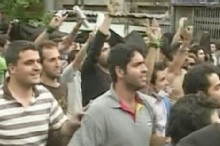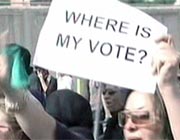TEHRAN, Iran – Iran's supreme leader says the country's recentpresidential elections showed off the country's religious democracy for the world to see.
Supreme Leader Ayatollah Ali Khamenei addressed the country in a rare speech at Friday prayers at Tehran University.
During the address to a packed hall that included President Mahmoud Ahmadinejad, Khamenei said that if the Iranian people did not feel free they would not have gone to the polls in such huge numbers as they did during the June 12th election.
Ahmadinejad was named the winner in the disputed election, leading to widespread protests that have formed an unprecedented challenge to the country's ruling clerics.
THIS IS A BREAKING NEWS UPDATE. Check back soon for further information. AP's earlier story is below.
TEHRAN, Iran (AP) — Iran's supreme leader addressed the nation Friday in his first public comments since opposition supporters flooded Tehran's streets in an unprecedented challenge to the country's ruling clerics.
Supreme Leader Ayatollah Ali Khamenei has already approved the June 12 election results that gave hard-line President Mahmoud Ahmadinejad a landslide victory, but he has not been able to ignore the powerful defiance of the opposition, which has called the vote rigged, of his authority.
Khamenei praised Iranians for taking part in the election and called it a "a magnificent show of responsibility of the people to determine the fate of their own country."
Khamenei was making his address as part of Friday prayers at Tehran University. Among the throngs of people crowded into the hall to see him speak was Ahmadinejad. It was not known whether Ahmadinejad's main challenger, Mir Hossein Mousavi attended as well.
Press TV, an English-language version of Iranian state television, showed television pictures of the crowded hall where Khamenei was speaking as the crowd and thousands of people assembled outside cheered.
The address comes one day after hundreds of thousands of protesters in black and green flooded the streets of Tehran in a somber, candlelit show of mourning for those killed in clashes after Iran's disputed presidential election.
The massive march — the fourth this week — sent a strong message that opposition leader Mousavi has the popular backing to sustain his challenge.
After the June 12 elections, Khamenei approved the balloting results as a "divine assessment" and urged the Iranian people to pursue their allegations of election fraud within the limits of the cleric-led system.
But this week's rallies, which recall the scale of protests during the 1979 Islamic Revolution that ended the Iran's U.S.-backed monarchy, openly defied those orders.
It may be hard for Khamenei — a man endowed with virtually limitless powers under Iran's constitution — to back down from his support of Ahmadinejad. But Mousavi and his supporters have also shown that they can't be brushed aside.
The supreme leader, who has the final say in all state matters, has tried to strike a compromise. On Monday, he ordered the Guardian Council, an unelected body of 12 clerics and Islamic law experts close to Khamenei, to investigate Mousavi's voter fraud claims.
Even Ahmadinejad has appeared to take the growing opposition more seriously and backtracked on his previous dismissal of the protesters as "dust" and sore losers.
"I was only addressing those who rioted, set fires and attack people. I said they are nothing," Ahmadinejad said in a previously taped video shown Thursday on state TV. "Every single Iranian is valuable. Government is a service to all."
The government has tried to placate Mousavi and his supporters by inviting him and two other candidates who ran against Ahmadinejad to a meeting Saturday with the Guardian Council. Abbasali Khadkhodaei, a spokesman for the council, said it received 646 complaints from the three candidates.
Mousavi accuses the government of widespread vote-rigging and demands a full recount or a new election, flouting the will of Khamenei.
The Guardian Council also has said it was prepared to conduct a limited recount of ballots at sites where candidates claim irregularities. But Mousavi accuses the government of widespread vote-rigging and demands a full recount or a new election, flouting the will of Khamenei.
Iran's ruling clerics still command deep public support and are defended by Iran's most powerful military force — the Revolutionary Guard — as well as a vast network of militias.
But Mousavi's movement has forced Khamenei into the center of the escalating crisis, questioning his role as the final authority on all critical issues.
So far, protesters have focused on the results of the balloting rather than challenging the Islamic system of government. But a shift in anger toward Iran's non-elected theocracy could result in a showdown over the foundation of Iran's system of rule.
The crowds in Tehran and elsewhere have been able to organize despite a government clampdown on the Internet and cell phones. The government has blocked certain Web sites, such as BBC Farsi, Facebook,Twitter and several pro-Mousavi sites that are vital conduits for Iranians to tell the world about protests and violence.
Text messaging, which is a primary source of spreading information in Tehran, has not been working since last week, and cell phone service in Tehran is frequently down. The government also has barred foreign news organizations from reporting on Tehran's streets.





Comments